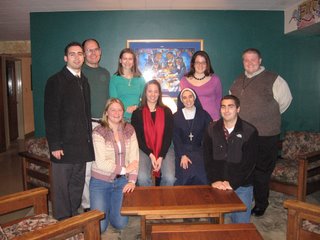 As we prepare for our "destruction" to begin on Monday, we share a few more "moving" moments from our experience:
As we prepare for our "destruction" to begin on Monday, we share a few more "moving" moments from our experience:This is a picture of the hole in the wall where an enormous crucifix hung between the second and third floors on the main stairwell. We are told that the crucifix was built into the wall when the wing was built. It is no surprise, therefore, that it took four moving men nearly two hours to get it out. It was packed in a wooden crate and will return when the construction is complete. (We shall refrain from waxing spiritual about what conclusions we may draw about the crosses in our own lives and the indelible marks they leave!)
In preparation for construction there are now some precautionary construction signs posted on the stairwell. They provide some idea how large the crucifix is.
 Sisters who have been trekking over to the monastery to clean up a few last items made a discovery today: a zip door. See photo on right. Our project managers installed a nifty zip door between the construction site and the entrance to the Chapel from the monastery side so as to minimize the amount of dust that flies into the Chapel. Brava!
Sisters who have been trekking over to the monastery to clean up a few last items made a discovery today: a zip door. See photo on right. Our project managers installed a nifty zip door between the construction site and the entrance to the Chapel from the monastery side so as to minimize the amount of dust that flies into the Chapel. Brava!
In preparation for construction there are now some precautionary construction signs posted on the stairwell. They provide some idea how large the crucifix is.
 Sisters who have been trekking over to the monastery to clean up a few last items made a discovery today: a zip door. See photo on right. Our project managers installed a nifty zip door between the construction site and the entrance to the Chapel from the monastery side so as to minimize the amount of dust that flies into the Chapel. Brava!
Sisters who have been trekking over to the monastery to clean up a few last items made a discovery today: a zip door. See photo on right. Our project managers installed a nifty zip door between the construction site and the entrance to the Chapel from the monastery side so as to minimize the amount of dust that flies into the Chapel. Brava!




